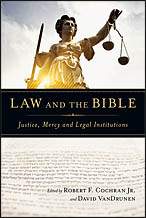
Robert F. Cochran Jr. & David VanDrunen, Eds.
Reviewed by: Diane L. Olinger
Law and the Bible: Justice, Mercy and Legal Institutions, edited by Robert F. Cochran Jr. and David VanDrunen. InterVarsity Press, 2013. Paperback, 269 pages, list price $24.00. Reviewed by OP member Diane L. Olinger.
Law and the Bible is a collection of nine articles, surveying the theme of civil law throughout the Bible. Each article is coauthored by an attorney and a Bible scholar. The Genesis-to-Revelation scope and the interdisciplinary approach make Law and the Bible a valuable resource for those who ask, What light does the Bible shed on contemporary legal systems, and particularly on Christian participation in those systems?
The focus of this book is on civil law, the law that orders human societies and is implemented and enforced by human government. The Bible addresses many areas of civil law, including evidence, civil and criminal procedure, court administration, and welfare regulations. However, the editors and most of the authors of Law and the Bible take pains to dampen our expectations of finding immediate applications to our current situation. Not every moral exhortation of Scripture should be codified. Not every piece of civil legislation in Scripture would be appropriate for the modern nation-state.
Most of the authors are reticent when it comes to advocating for particular legislation, and merely suggest principles that should guide a Christian in making policy decisions. One exception to this reticence is the chapter entitled "Crying Out for Justice: Civil Law and the Prophets," by Barbara E. Armacost and Peter Enns. In discussing U.S. immigration law, the authors take a firm stand against "anti-immigrant legislation that is calculated to be oppressive" (p. 143) (examples include laws prohibiting illegal aliens from contracting for utilities, laws that require public schools to determine immigration status of students, and laws that empower local police as deputy immigration enforcers). "While it would be just to deport those who are in the United States illegally pursuant to fair procedures and policies, it is not just to mistreat them while they live among us" (p. 143).
Other topics addressed include civil disobedience (with a case study on apartheid in South Africa), form of government, war, abortion (very briefly), adoption, lawsuits by Christians, catastrophic climate change, and nuclear holocaust (the last two as part of a discussion of end-times prophecies in Daniel and Revelation).
Natural law is a theme set forth in the book's introduction and is revisited by a number of authors. As Randy Beck and David VanDrunen write in their analysis of law from creation through the patriarchal period, "When the patriarchs have legal disputes with their pagan neighbors, they do not appeal to a parochial moral standard known only through special revelation, but they presume (as their pagan neighbors often do also) a standard that is accessible to all.… However Christians may develop a theory of natural law, the existence of a universal moral standard has many potential implications for how they approach legal life in a diverse society" (p. 45). Although VanDrunen does not mention his two-kingdoms theology explicitly, Robert F. Cochran Jr. and Dallas Willard, authors of the chapter on Jesus and the civil law, critique VanDrunen's argument that Jesus' demanding kingdom ethics apply institutionally only to the church and not the state, which is to enforce lex talionis, "an eye for an eye." According to Cochran and Willard, "This too neatly avoids the difficult work of determining the implications for the state of Jesus' teaching on love" (p. 173).
The style of writing in this volume is described in the forward as "learned but accessible" (p. 9), and that is a good description. This makes Law and the Bible useful not only to lawyers and law students, pastors and seminarians, but also to individual Christians with an interest in the implications of the Christian faith for civil law.
January 18, 2026
January 11, 2026
Texts that Transform: Church and Ministry
January 04, 2026
December 28, 2025
December 21, 2025
December 14, 2025
December 07, 2025
© 2026 The Orthodox Presbyterian Church